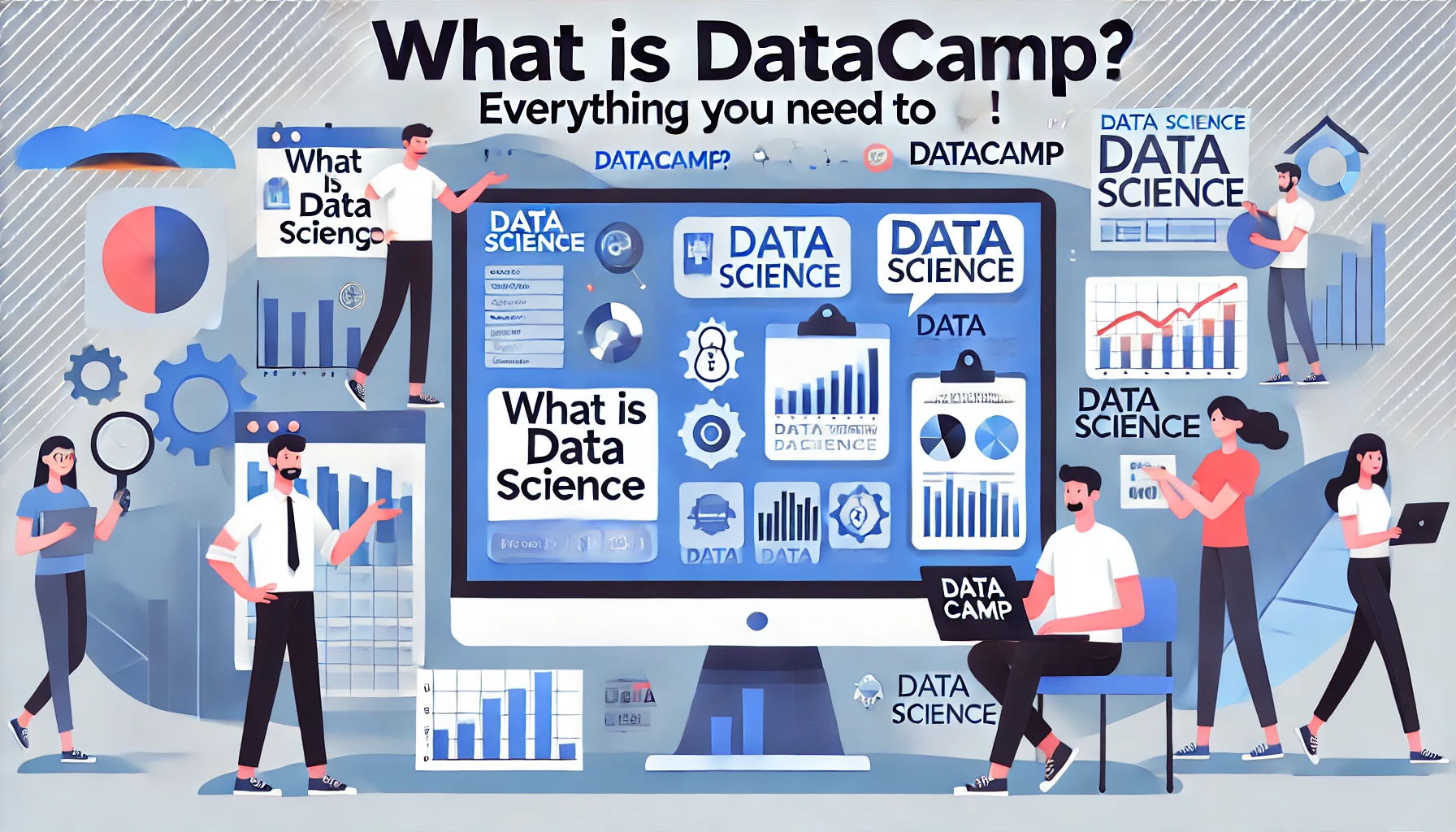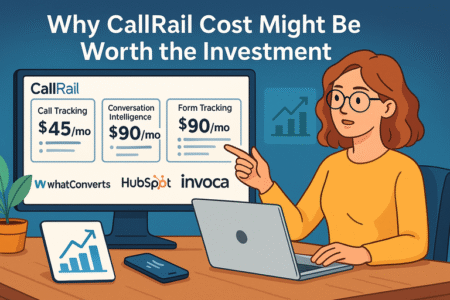Table of Contents
What is DataCamp?, and how does it help with data skills? This article dives into everything you need to know about DataCamp, from course offerings and subscription models to key benefits and user support.
If you’re looking to boost your data expertise or considering DataCamp for learning analytics, machine learning, or coding skills, keep reading to see how it aligns with your needs.
Overview Of DataCamp’s Platform
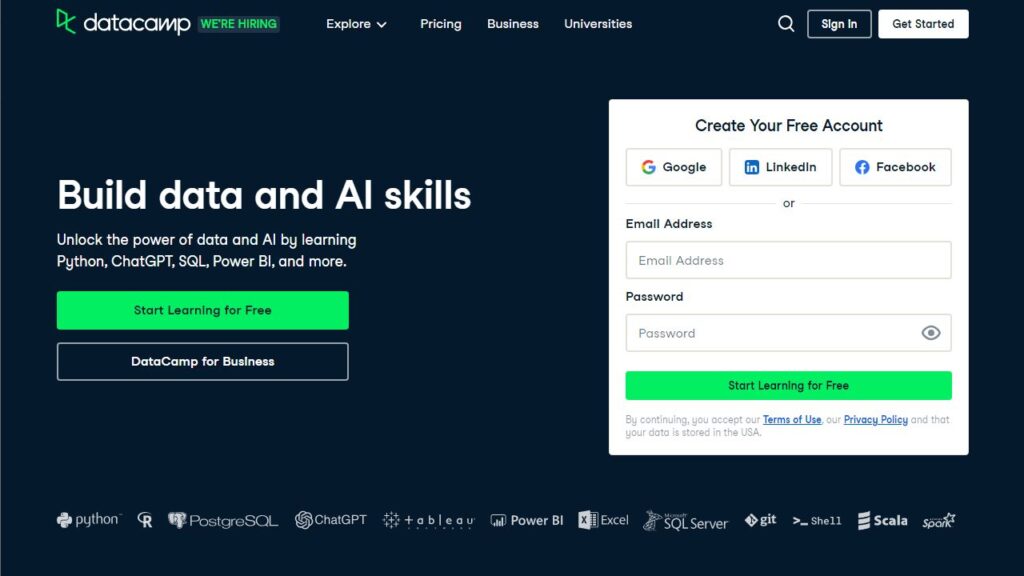
DataCamp is a popular platform for anyone interested in building data science and analytics skills. It provides an interactive, user-friendly experience that makes learning data topics approachable and fun, even for complete beginners.
What Sets DataCamp Apart From Competitors
DataCamp stands out due to its hands-on approach and focus on real-world data applications. I believe it’s a fantastic choice if you prefer practicing skills over theoretical lectures. You’ll find a unique emphasis on exercises, which is rare on many platforms.
The platform also supports a wide range of topics, from Python and R to SQL, machine learning, and beyond. I’d suggest it for anyone aiming to cover multiple disciplines under one subscription. Each topic has structured modules for progressive learning, keeping lessons bite-sized and engaging.
Another distinguishing factor is DataCamp’s career tracks and skill tracks. These organized paths make learning straightforward, giving you clear milestones to reach your professional goals. Each track is designed to build specific competencies, making the journey focused and measurable.
Plus, DataCamp offers browser-based coding, meaning there’s no need to install software. This feature allows you to dive into coding right away, eliminating setup hassles. It’s a practical touch that many users appreciate.
Key Features That Define DataCamp
DataCamp features interactive exercises and instant feedback on your code, making the learning process much smoother. You’ll complete projects that mimic real-world tasks, allowing you to apply what you’ve learned in practical settings right from the start.
The platform also provides access to learning paths like career and skill tracks, which guide your progress. Each path is curated to develop expertise in a specific area, helping you focus on a career in data science, data engineering, or analysis.
DataCamp’s mobile app adds flexibility, allowing you to practice data skills on the go. It’s convenient for squeezing in learning sessions anytime, whether you’re commuting or waiting in line, making learning adaptable to your lifestyle.
Additionally, DataCamp offers “XP points” to track progress, which can keep you motivated. Every completed exercise earns you points, giving a sense of accomplishment and encouraging consistency as you climb the leaderboard.
Learning Paths And Specializations
DataCamp’s learning paths, called skill tracks and career tracks, are designed for structured progression. If you’re starting, the skill tracks provide focused learning in areas like Python, R, or SQL. Each track covers core concepts comprehensively.
Career tracks take specialization further, guiding learners through data science, data engineering, and machine learning fields. These are particularly useful if you aim to break into a specific data career, covering everything from basics to advanced skills.
DataCamp also has dedicated paths for specific roles. If you’re looking to become a data analyst or scientist, career paths provide the exact skills needed. They build skills step-by-step, preparing you for hands-on projects in real work environments.
Specializations also allow you to dive deeper. With multiple tracks and focused modules, DataCamp enables in-depth learning for diverse data roles. It’s a practical choice if you want to gain both breadth and depth in data skills.
Who Is DataCamp Best Suited For?
DataCamp appeals to a range of users, from complete beginners to seasoned professionals. It’s a flexible platform that meets various learning needs, making it an ideal choice for anyone keen on data skills development.
Professionals Seeking Data Skills
For professionals, DataCamp offers industry-relevant skills that can boost career growth. If you’re working in a role where data analysis is essential, DataCamp can sharpen your skills and broaden your knowledge base in data science and analytics.
DataCamp’s focus on practical skills makes it ideal for busy professionals. Lessons are short and can fit into a packed schedule, which I recommend if you need flexible learning options. It allows you to advance your skills without committing to long study hours.
The platform’s professional courses cater to business needs, like data-driven decision-making. DataCamp’s content aligns with real-world scenarios, making it highly applicable for anyone looking to drive results with data insights.
With certifications available, professionals can also showcase their achievements, adding value to resumes and LinkedIn profiles. These credentials are recognized in the industry, making them useful for job seekers or those aiming for promotions.
DataCamp For Students And Beginners
DataCamp is beginner-friendly, with courses designed to introduce data concepts in digestible chunks. If you’re a student or new to data, I believe it’s an excellent starting point, providing the basics before diving into more complex topics.
The platform emphasizes a hands-on approach, allowing students to apply concepts right after learning. DataCamp’s exercises reinforce understanding, which I find essential for beginners who benefit from active learning over passive lectures.
Short lessons mean students won’t feel overwhelmed. Topics are broken into manageable sections, making it easier for new learners to grasp. This style is ideal for those balancing studies with learning data skills on the side.
DataCamp’s interactive exercises also make learning enjoyable. The gamified structure and instant feedback help beginners stay motivated and engaged, turning what could feel complex into an accessible and rewarding experience.
Companies Using DataCamp For Employee Training
Companies often turn to DataCamp to upskill their workforce in data literacy. It’s a powerful tool for organizations looking to empower employees with analytics and decision-making skills that align with modern business needs.
DataCamp for Business offers tailored training paths, allowing companies to track employee progress. It’s ideal for organizations aiming to foster a data-driven culture, with courses spanning data science, machine learning, and beyond.
The platform provides analytics to monitor team progress, which I’d recommend for managers who want to assess training impact. This feature enables companies to identify skills gaps and ensure employees are making measurable progress.
Many businesses find value in DataCamp’s flexible learning model, as employees can complete courses at their own pace. This flexibility makes it easy for teams to balance their job responsibilities with learning new skills.
Exploring DataCamp’s Course Offerings
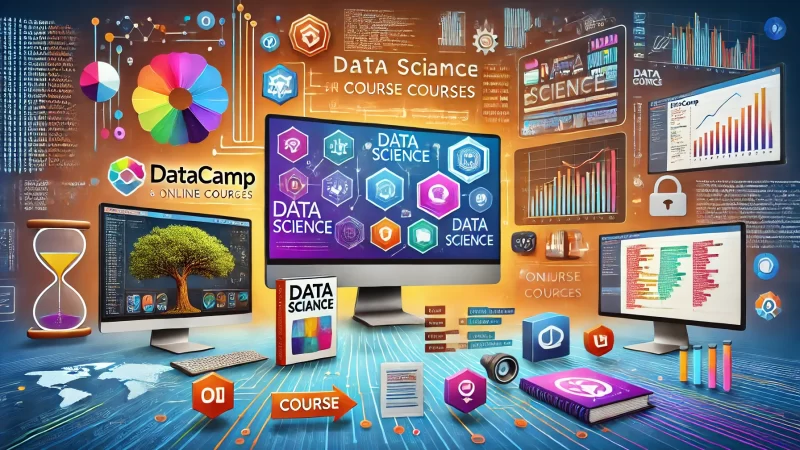
DataCamp offers a wide range of courses designed to meet different learning needs in data science and analytics. It’s an excellent platform for learners at all levels, with diverse topics and flexible options to enhance their data expertise.
Popular Data Science Courses On DataCamp
DataCamp’s data science courses cover essential skills like data analysis, visualization, and machine learning. Courses include hands-on practice, making it easy to apply new knowledge. I suggest these courses if you’re aiming to master data science fundamentals quickly.
Python courses are especially popular among learners looking to start in data science. These courses cover Python basics, data manipulation, and visualization, giving beginners a solid foundation. Each course is designed to build progressively, which keeps learning structured.
For those interested in machine learning, DataCamp provides courses that introduce algorithms and model-building techniques. You’ll learn concepts such as regression, clustering, and decision trees, which are critical for understanding how machine learning works.
The SQL courses are ideal for database enthusiasts. SQL is a valuable skill in data analytics, and DataCamp’s SQL courses allow you to explore databases, run queries, and organize data effectively. I believe this is perfect for learners in database management.
Overview Of DataCamp’s Coding Languages
DataCamp supports various coding languages like Python, R, and SQL, catering to different interests. If you’re a beginner or have a specific focus, these language-specific courses can make learning data skills more focused and manageable.
Python is the most popular on DataCamp, with many learners choosing it for its flexibility and wide application. Python courses on DataCamp are perfect for data analysis, machine learning, and even web development, making it a great all-rounder.
R is another key language available on DataCamp, especially for data scientists working in statistics and research. If you’re into statistical analysis, R courses provide a deep dive into data manipulation and visualization techniques.
SQL courses target users interested in managing and querying databases. SQL is an essential skill in data analytics, and DataCamp’s SQL-focused modules teach you to retrieve, organize, and manipulate data, which is highly valued in data-driven roles.
Certifications And Career Tracks Available
DataCamp’s certifications allow learners to validate their skills, which I recommend if you want to showcase your expertise professionally. These certifications can be displayed on LinkedIn, highlighting your data capabilities to potential employers.
Career tracks offer structured learning paths, guiding learners through specific roles like data scientist or data analyst. Each track includes essential courses to build job-ready skills. I’d advise anyone aiming for a data role to explore these tracks.
DataCamp’s career tracks are designed to provide practical skills for data-related jobs, combining theory with hands-on practice. This approach ensures learners gain real-world skills applicable in today’s data-driven industries.
Skill tracks are shorter and focused on specific skill areas, like Python for data science or SQL fundamentals. These tracks are perfect for those who want to gain targeted expertise without committing to an entire career path.
How DataCamp Works: A Step-By-Step Guide
DataCamp offers a straightforward learning process that makes building data skills accessible. With an easy-to-navigate platform and hands-on approach, users can learn and practice data topics in an interactive, engaging way.
Getting Started With A DataCamp Account
Setting up a DataCamp account is simple. You’ll start with basic details and can choose a free trial to explore the platform. I recommend starting with the trial to understand the layout and sample courses, making the platform familiar.
Once your account is created, you’ll have access to a dashboard displaying recommended courses. The dashboard makes it easy to track your progress, view recently accessed courses, and check upcoming classes or certifications available.
Selecting a learning path is your next step. DataCamp offers career and skill tracks, which help guide your learning journey. This feature helps users stay on track and ensures a structured learning experience tailored to their goals.
Choosing a subscription plan is part of getting started if you wish to access full courses. DataCamp provides individual and team plans, catering to personal learners and businesses. These options offer flexibility based on your learning needs.
Understanding DataCamp’s Interface
DataCamp’s interface is clean and intuitive, with a layout designed to minimize distractions. Lessons, exercises, and quizzes are organized seamlessly, making navigation simple. This approach allows you to focus on learning without unnecessary interruptions.
Each course module is organized into bite-sized lessons. I appreciate this structure, as it allows users to make steady progress without feeling overwhelmed. Every lesson builds on the last, helping you understand and retain new concepts effectively.
The coding interface is browser-based, meaning no downloads are needed. You can practice exercises directly on the platform, which I think is convenient, especially for beginners who may find setup tasks complicated.
DataCamp also provides hints and solutions, so if you get stuck, you can quickly find guidance. This feature ensures you keep learning smoothly and can overcome challenges without getting frustrated or losing momentum.
Using Interactive Exercises To Learn
Interactive exercises are a core part of DataCamp’s appeal. Each lesson includes practice exercises that reinforce what you’ve learned, allowing you to apply concepts right away. This method helps solidify knowledge and makes learning more engaging.
These exercises cover various scenarios, mimicking real-world applications of data skills. I suggest taking your time with them, as they provide valuable hands-on experience and help you see how data skills work in practical situations.
DataCamp’s instant feedback feature enhances the learning process. When you submit your code, you’ll receive immediate insights, highlighting areas to improve. This feedback loop helps refine your skills continuously and builds confidence.
The platform’s gamified elements, such as XP points, make the experience enjoyable. Completing exercises and earning points adds a sense of accomplishment, which I believe keeps users motivated to continue learning and achieve their goals.
Assessing Skills With DataCamp’s Quizzes
DataCamp’s quizzes help assess your understanding and ensure you’re ready to move forward. Each quiz covers material from the lesson, providing a recap that tests comprehension and reinforces learning. Quizzes are brief but cover essential points.
Quizzes allow you to track your progress and see how well you’ve grasped concepts. I’d advise taking quizzes seriously, as they’re great indicators of areas that may need further review. They’re also perfect for solidifying your knowledge.
After each quiz, DataCamp provides a score and feedback. This insight helps pinpoint strengths and areas needing improvement, which I find incredibly valuable for learning. It enables users to focus on topics where they need more practice.
Quizzes are strategically placed throughout courses, maintaining a balanced mix of instruction and assessment. This design keeps learners engaged and motivated while ensuring they master each topic before progressing further.
DataCamp Subscription Plans And Pricing
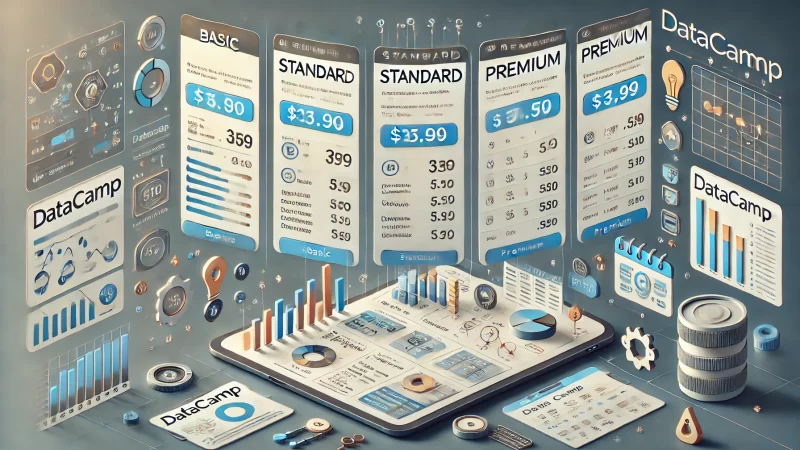
DataCamp provides flexible subscription options to suit various budgets and needs, whether you’re a solo learner or part of a team. You can explore different plans to find one that best aligns with your goals and learning style.
Monthly And Annual Subscription Options
DataCamp offers both monthly and annual subscription plans. The monthly plan is great if you prefer a short-term commitment. I’d recommend it for those wanting a quick introduction to DataCamp’s courses and features.
The annual subscription is more cost-effective, providing long-term access at a reduced rate. This plan suits learners dedicated to enhancing their data skills over several months. It’s a smart choice if you’re looking to save.
Each plan includes unlimited access to courses, allowing you to explore a wide range of topics without restrictions. You’ll find flexibility in learning multiple subjects, which I think is a major benefit of DataCamp’s model.
You can easily switch between monthly and annual options if your goals change. This flexibility makes DataCamp accessible and adaptable, helping you choose a plan that evolves with your needs and learning pace.
DataCamp For Teams And Enterprise Solutions
DataCamp for Teams provides tailored solutions for companies aiming to train employees in data skills. I’d suggest this option for organizations looking to boost their data-driven capabilities and foster a culture of data literacy.
This plan includes analytics tools for managers, making it easy to track team progress and identify areas for improvement. It’s a useful feature for monitoring individual development and ensuring the training aligns with business goals.
The enterprise solution offers additional customization, including personalized learning paths and dedicated support. It’s ideal for larger companies needing scalable solutions, allowing them to provide focused training across departments.
DataCamp for Teams is also highly flexible, letting employees learn at their own pace. This adaptability ensures training fits seamlessly with job responsibilities, making it a practical choice for companies prioritizing employee development.
Free Trial And Scholarship Opportunities
DataCamp provides a free trial, allowing new users to explore the platform before committing. I recommend starting with the trial, as it’s a great way to assess if DataCamp’s approach and content meet your learning needs.
Scholarships are also available for students and educators, making DataCamp more accessible. I believe these opportunities are invaluable for learners on a budget, as they lower barriers and encourage data education for all.
With the free trial, you can test different courses and experience DataCamp’s interactive style. This hands-on preview helps you determine whether DataCamp aligns with your goals, giving you a taste of the learning experience.
Scholarship programs open doors for those in academia, helping students gain essential data skills. DataCamp’s commitment to accessibility makes it a great choice for diverse learners, promoting education in an inclusive way.
Key Benefits Of Learning On DataCamp
DataCamp provides numerous benefits that make learning data science and analytics more accessible and effective. From flexible pacing to real-world projects, the platform offers unique advantages for learners at every stage of their data journey.
Practical Skills In High-Demand Fields
DataCamp’s courses focus on building practical, job-ready skills in high-demand areas like data science, machine learning, and business analytics. I recommend this approach for anyone aiming to apply data knowledge directly to professional scenarios.
Hands-on exercises help reinforce learning, making it easier to understand complex concepts. Each lesson includes interactive elements that mimic real-world tasks, which I find essential for mastering data skills that are useful in a work environment.
Courses are designed around industry needs, covering topics like Python, SQL, and R, which employers value. DataCamp’s practical approach is perfect if you’re looking to gain skills that translate into tangible workplace contributions.
The platform’s curriculum includes project-based learning, which allows you to build a portfolio. These projects showcase your abilities, making it easier to demonstrate your skills to potential employers and colleagues.
Flexibility In Learning Pace And Schedule
DataCamp offers self-paced courses, allowing you to learn on your schedule. This flexibility is ideal if you’re balancing other commitments, making it easier to integrate data learning into a busy lifestyle without feeling rushed.
I’d suggest taking advantage of this self-paced model, as it allows you to spend extra time on challenging topics. You can move quickly through familiar areas or slow down when learning new material, customizing your experience.
The platform’s mobile app enhances flexibility, letting you study on the go. Whether you’re commuting or taking a break, DataCamp’s mobile access ensures learning remains convenient and uninterrupted, keeping you on track with your goals.
With DataCamp, you set your learning schedule, making it possible to fit training into any lifestyle. This adaptability ensures that learning data skills is accessible, no matter how packed your daily routine may be.
Real-World Applications And Portfolio Projects
DataCamp emphasizes real-world applications, with projects that simulate actual job tasks. These projects are a fantastic way to apply what you’ve learned, building confidence and giving you practical experience in real data scenarios.
Projects are varied, covering topics from data cleaning to advanced machine learning. Each project adds value to your portfolio, making it easier to demonstrate your skills to potential employers. I’d suggest focusing on these projects for hands-on practice.
Portfolio projects provide tangible proof of your abilities, which I think is a major benefit of DataCamp. Having a portfolio makes it easier to transition into data roles, showcasing what you can accomplish with data insights.
These projects don’t just teach technical skills—they also build problem-solving and analytical abilities. DataCamp’s emphasis on practical applications ensures you’re well-prepared for real-world data challenges, making learning meaningful.
DataCamp’s Certification And Job Placement
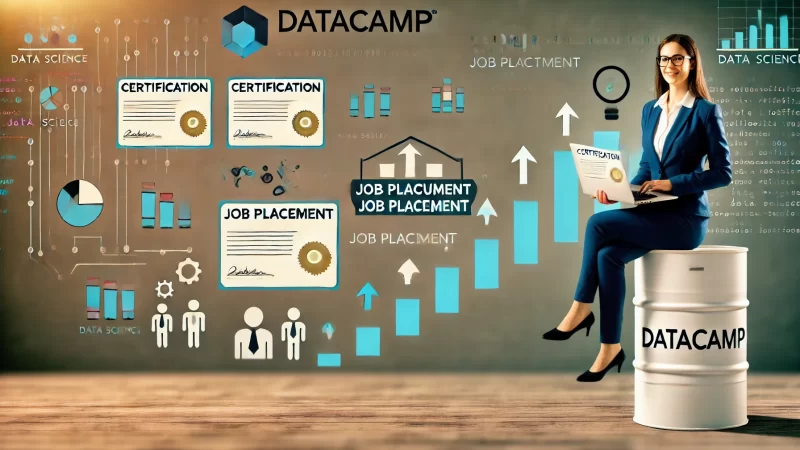
DataCamp offers certifications that validate your data skills, which can enhance your career prospects. With career resources and portfolio-building tools, the platform supports learners in translating skills into job opportunities.
DataCamp Certifications And Their Value
DataCamp’s certifications demonstrate expertise in data fields, adding value to your resume. Earning these certifications can boost your professional credibility. I recommend them if you want to showcase your skills to employers or colleagues confidently.
Each certification covers specific skills, allowing you to highlight your strengths. Whether in Python, data analysis, or machine learning, DataCamp certifications provide verifiable proof of your capabilities, enhancing your professional profile.
Certifications are well-regarded in the industry, making them a useful asset for job seekers. DataCamp’s courses and assessments ensure that each certification reflects a thorough understanding of the subject matter, which I think is reassuring.
With a DataCamp certification, you stand out in competitive job markets. It demonstrates commitment to professional development, which I believe employers value, particularly in data-driven roles where expertise is essential.
Job Placement Assistance And Resources
DataCamp offers career resources that help you navigate job searches effectively. With resume tips, interview guidance, and networking advice, these tools are invaluable for learners aiming to transition into data roles successfully.
These resources include resume-building tips tailored to data careers. I suggest using these guides to align your resume with industry standards, which can help make a strong impression in applications and during interviews.
DataCamp’s interview preparation resources are practical for anyone entering the job market. You’ll learn what to expect in data-related interviews, helping you prepare with confidence and demonstrate your skills effectively.
Networking resources are also available, giving you insights into building professional connections. I recommend exploring these tools, as they can open doors in the data field, making it easier to find opportunities that align with your career goals.
Building A Data Portfolio With DataCamp
DataCamp supports portfolio building, allowing you to showcase completed projects. I advise focusing on this feature, as a well-curated portfolio demonstrates your abilities, making you a more attractive candidate to potential employers.
Your portfolio can include real-world projects completed through DataCamp, offering tangible proof of your skills. Each project showcases your analytical and technical abilities, helping you stand out in the competitive data science field.
Portfolio projects help demonstrate your hands-on experience, which I believe is highly valuable. Employers appreciate candidates who can show applied skills, as it indicates readiness to tackle data tasks from day one.
A portfolio also allows you to track your growth over time. As you progress on DataCamp, you’ll see how your projects evolve, which is a great way to reflect on your learning journey and celebrate milestones in skill development.
Comparing DataCamp With Other Platforms
DataCamp offers unique features, yet many learners wonder how it compares to platforms like Coursera, Udacity, and EdX. Understanding these differences can help you choose the one that aligns best with your data learning goals.
DataCamp vs Coursera: A Detailed Comparison
DataCamp specializes in interactive data science training, while Coursera offers a broader range of subjects. I’d suggest DataCamp for focused data science tracks, as Coursera’s wide curriculum may feel less targeted for data-only learners.
Coursera partners with universities, which gives it an edge for those wanting academic certifications. If university-backed courses are important to you, Coursera’s affiliations might provide additional credibility and recognition in your learning journey.
DataCamp’s exercises focus on practical skills, with instant feedback, ideal for hands-on learners. Coursera, however, leans more on theoretical instruction and structured lectures. I’d say DataCamp’s approach feels more dynamic if you prefer practice over theory.
In terms of pricing, DataCamp is subscription-based, while Coursera charges per course or specialization. If you plan to explore multiple data topics, DataCamp’s subscription may offer more flexibility and better value for long-term use.
How DataCamp Stands Against Udacity And EdX
Udacity’s nano degrees provide intensive, project-based learning that’s ideal for job-ready skills, similar to DataCamp’s career tracks. DataCamp is more focused on data science, so I’d recommend it for those seeking specialized, in-depth data training.
EdX offers university courses, often for free, making it accessible for learners interested in self-paced study. DataCamp’s paid model, however, delivers structured data tracks, which could benefit learners looking for guided learning and faster progress.
DataCamp emphasizes beginner-friendly data science paths, which may suit learners new to data. Udacity’s content is often intermediate to advanced, making it a better fit if you already have a data foundation and need to deepen your expertise.
In terms of flexibility, DataCamp allows monthly subscriptions, which I think works well if you’re not ready for Udacity’s more time-intensive commitments. This flexibility ensures DataCamp suits diverse learning styles and schedules.
Which Platform Offers The Best Value For Data Skills?
DataCamp’s focus on data and analytics positions it as a strong value for data-specific training. If your goal is to develop practical data skills quickly, I’d recommend DataCamp over more general platforms for its specialized tracks.
Coursera and EdX provide academic recognition, which can be valuable if you’re seeking university-backed credentials. However, if hands-on, career-oriented data training is what you’re after, DataCamp’s emphasis on real-world exercises is highly effective.
Udacity’s intensive programs offer substantial depth, though often at a higher cost. DataCamp’s more affordable subscription and data-only focus could make it a more efficient choice for learners specifically interested in data science fields.
Ultimately, each platform has its strengths, but for data-centric learning with interactive exercises, DataCamp stands out. I suggest choosing based on your specific career goals, schedule, and whether academic credentials or practical skills matter more.
User Support And Community Resources
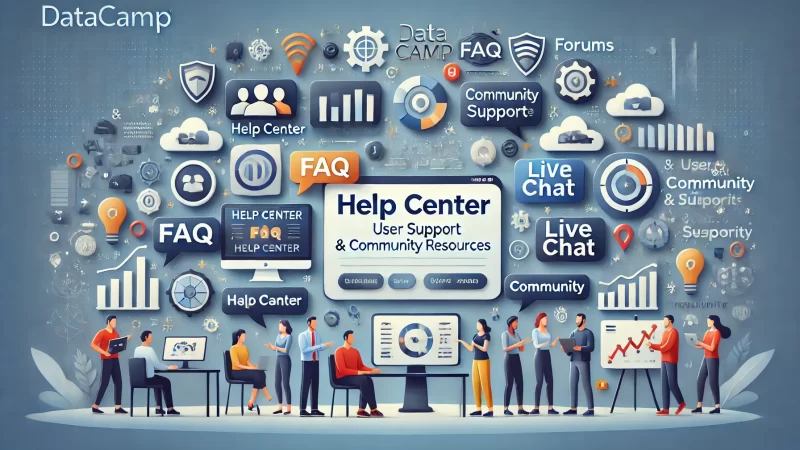
DataCamp provides user support and community resources to enhance your learning experience. With various support options and an active community, you’ll find answers, connect with other learners, and get the guidance you need to succeed.
Accessing DataCamp’s Support Resources
DataCamp’s support team is accessible through email and live chat for help with technical issues or questions. I recommend reaching out directly if you encounter difficulties; the team is responsive and provides quick assistance to keep you on track.
In addition to direct support, DataCamp offers a knowledge base filled with FAQs, troubleshooting tips, and guides. This resource is helpful for common queries and offers instant answers without waiting for support replies.
DataCamp’s tutorials and onboarding resources ensure you understand the platform and its features. I suggest exploring these tutorials, as they can help you navigate effectively and maximize your learning experience.
You’ll also find step-by-step guides for common tasks, from setting up an account to navigating course content. These resources make it easy to get started and troubleshoot issues on your own, enhancing your learning journey.
Engaging With DataCamp Community Forums
DataCamp’s community forums are an excellent place to connect with other learners. Engaging with the community can provide support and insights from peers, which I find incredibly helpful for answering questions and learning collaboratively.
Forums allow you to share challenges and ask for advice on specific topics, which can enhance your understanding. I suggest posting questions when you need clarification; other learners or instructors often respond with helpful solutions.
The forums also feature discussions on data science trends and best practices. Participating in these discussions keeps you updated on industry developments and offers a sense of community, making your learning more interactive and engaging.
Active participation in forums can boost your motivation and deepen your knowledge. Sharing your experiences and learning from others creates a support system that enhances your learning journey on DataCamp.
Joining DataCamp’s Live Events And Webinars
DataCamp hosts live events and webinars covering various data topics, offering extra learning opportunities. These sessions are insightful, allowing you to learn from data professionals, which I believe adds value beyond regular course content.
Webinars focus on trends in data science, providing knowledge on emerging tools and methods. Attending these sessions can expand your understanding of the field and keep you up-to-date with new techniques and best practices.
Live events also include Q&A sessions, where you can ask experts about specific topics. These interactions can offer clarity on complex subjects, making DataCamp’s live events a great resource for in-depth learning and professional advice.
I’d recommend participating in these events, as they provide networking opportunities with fellow learners and instructors. Building connections in these sessions can create long-term professional relationships and enrich your learning experience.
Pros And Cons Of Using DataCamp
Like any platform, DataCamp has its advantages and limitations. Considering these pros and cons can help you decide if it’s the right choice for your data learning journey and whether it aligns with your professional goals.
Advantages Of Learning On DataCamp
DataCamp’s focus on interactive, hands-on learning sets it apart. Courses feature exercises that reinforce concepts, making learning engaging and effective. I recommend it if you prefer active learning rather than passive video lectures.
Its flexible subscription model allows access to a wide range of data-focused content. I find this helpful for learners exploring multiple data topics, as it provides the freedom to study various skills without extra costs.
DataCamp’s mobile app enables learning on the go, adding convenience for busy schedules. You can continue lessons anywhere, which I think makes DataCamp accessible and adaptable for modern, on-the-move learners.
Project-based learning ensures practical skills, allowing users to build portfolios. DataCamp’s projects simulate real-world tasks, giving you hands-on experience and creating a portfolio to showcase your data expertise to potential employers.
Limitations To Consider Before Joining
DataCamp’s focus on data may feel limiting if you’re interested in a broader curriculum. Other platforms like Coursera or Udacity offer diverse topics, so I’d advise considering these if you’re looking beyond data-specific learning.
Courses on DataCamp are often shorter, which some advanced learners may find lacking in depth. If you’re aiming for deeper specialization, a more comprehensive program might be a better fit for building advanced expertise.
While DataCamp includes practical exercises, the lack of instructor feedback can be a drawback. For those who prefer one-on-one guidance, other platforms with mentor support, such as Udacity, might offer more personalized learning.
DataCamp is subscription-based, meaning continued access requires ongoing payments. If you’re seeking lifetime access, one-time purchase platforms like Udemy might offer more cost-effective options. Choose based on your preference for long-term access.


